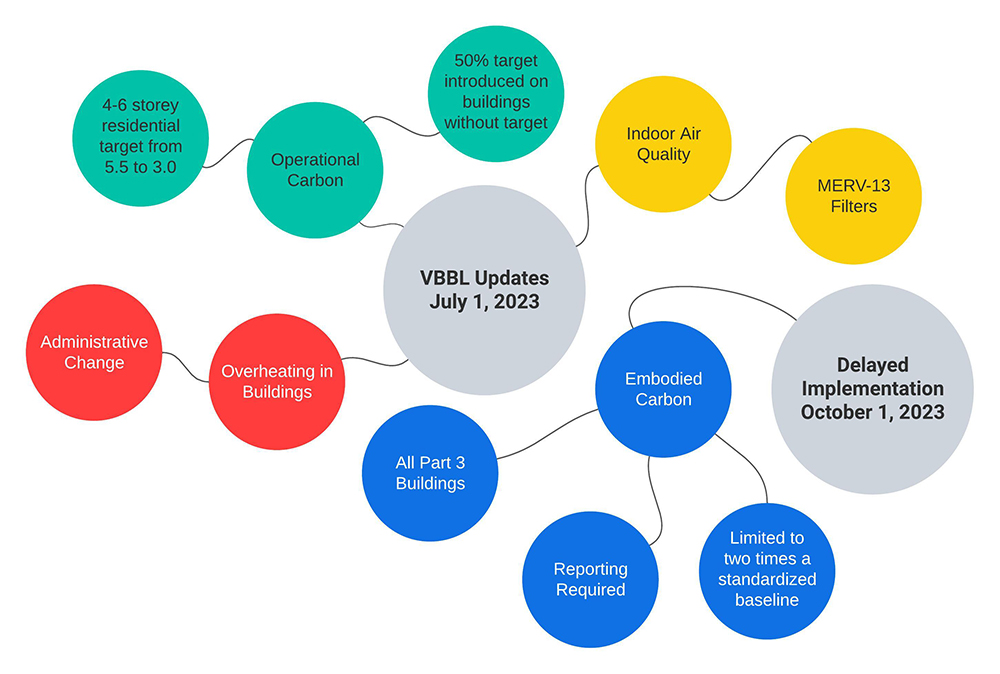As cities around the world grapple with the pressing need to address climate change, Vancouver, a city known for its commitment to sustainability, is taking further strides to reduce carbon emissions, promote resilient buildings, and address embodied carbon. In a series of proposed building by-law changes, Vancouver aims to create a greener and more sustainable built environment. Let’s take a closer look at these proposed changes set to take effect on July 1, 2023. (Edits applied – June 28, 2023)
Operational Carbon
One of the key proposed changes is the reduction of operational carbon emissions limits for new residential buildings. Specifically, the carbon emissions limit for 4-6 storey residential buildings (excluding hotels/motels) will be lowered from 5.5 to 3.0 kgCO2e/m2. By decarbonizing hot water heating, which represents a significant portion of emissions in buildings, this change marks a crucial step towards reducing carbon emissions in new constructions. It aligns with Vancouver’s commitment to combat climate change and emphasizes the importance of energy-efficient systems in residential buildings.
The proposed changes extend beyond residential buildings. For building types such as assembly, care, and industrial, which currently have no requirement to reduce operational carbon emissions, a 50% reduction target will be introduced. This significant step aims to ensure that all building types align with the goal of reducing carbon emissions, contributing to the overall efforts to mitigate climate change.
Proposed changes introduce a requirement for minimum MERV 13 filters in new building ventilation systems. This change seeks to block the entry of particulates resulting from wildfires and air pollution into buildings through mechanical ventilation systems.
Overheating in Buildings
An administrative change will incorporate existing overheating limits from the referenced City of Vancouver guidelines into the by-law. This change seeks to improve the visibility, accountability and enforceability of overheating limits, ensuring that building designs prioritize occupant comfort and mitigate the risk of overheating.
Embodied Carbon
Implementation of these requirements has been delayed until October 1, 2023.
Acknowledging the importance of addressing embodied carbon in construction, the proposed changes introduce an embodied carbon reporting requirement for all new Part 3 buildings. Embodied carbon refers to the carbon emissions associated with the extraction, manufacturing, and transportation of building materials.
By requiring reporting and setting a limit of maximum two times the standardized baseline, Vancouver aims to foster industry-wide capacity and knowledge of embodied carbon. This change encourages the use of low-carbon materials and promotes sustainable construction practices, marking an important step towards a more environmentally conscious building sector.
Summary
Vancouver’s proposed building by-law changes reflect the city’s unwavering commitment to sustainability and combating climate change. By reducing carbon emissions limits and addressing embodied carbon, these changes pave the way for a greener and more resilient built environment. With the effective date of July 1, 2023, Vancouver is poised to achieve even greater sustainability milestones, inspiring other cities to follow suit in their pursuit of a more sustainable future.
Links to City of Vancouver documents to read more about the changes effective July 1, 2023 and those planned for dates in the future:
https://council.vancouver.ca/20220517/documents/R1a.pdf
Link to Bulletin Announcing Delay of Implementation for Embodied Carbon Requirements:
https://vancouver.ca/files/cov/2023-001-ad-delay-of-embodied-carbon-implementation.pdf
